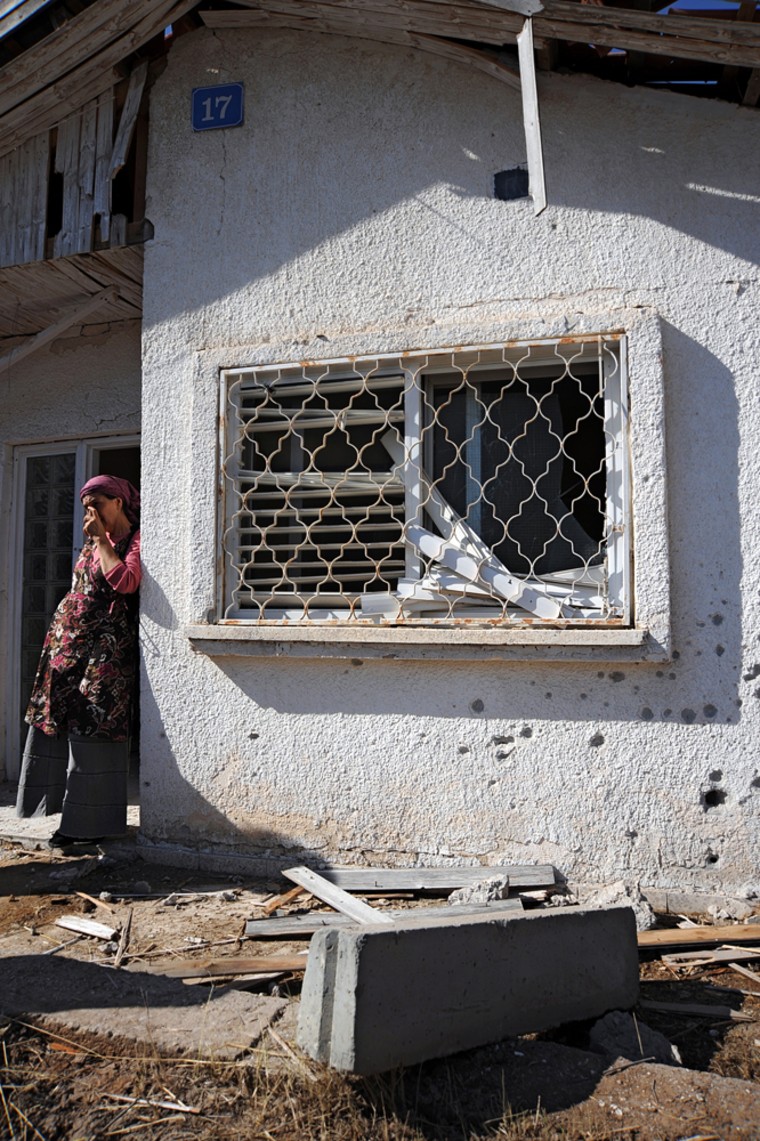The Israeli military said it closed the crossings where cargo enters the Gaza Strip in response to rocket fire that violated a new truce between Israel and Gaza militants.
The military said all crossings have been closed except for the Erez pedestrian terminal. The truce began six days ago, and on Sunday Israel began incrementally increasing the amount of goods entering Gaza.
Hamas spokesman Fawzi Barhoum said Wednesday's closure violated the cease-fire.
On Tuesday, militants fired at least two rockets into southern Israel.
The attack came hours after Israeli troops killed two Palestinians in a West Bank raid. The victims included an Islamic Jihad commander. The militant group later claimed responsibility for firing the rockets, saying the attack was intended to avenge the Israeli operation.
Israel condemned the attack as a "gross violation." But said an envoy would soon head to Egypt to work on the final stage of the truce agreement: a prisoner swap that would bring home an Israeli soldier held by Hamas for more than two years.
Despite the rocket fire, Hamas, the militant Islamic group that rules Gaza, said it remained committed to the truce and urged restraint by all sides.
Day of violence
The midafternoon barrage, which lightly wounded two people, capped a day of violence that presented the truce with its first serious test. Just before midnight, Palestinian militants fired a mortar shell into an empty area in southern Israel. And in a pre-dawn raid, Israeli troops killed two Palestinians in the West Bank city of Nablus.
Although the West Bank is not included in the truce agreement, the Islamic Jihad group said the rockets were retaliation for the Nablus raid.
"We cannot keep our hands tied when this is happening to our brothers in the West Bank," the group said.
A neighbor said a Palestinian bystander was also shot to death by troops when he opened the door of his apartment during the raid. The Israeli military said the man was a militant killed during a gunbattle with troops.
Hamas accused Israel of provoking the rocket fire but moved quickly to lower tensions and said it would talk to Islamic Jihad to ensure quiet.
"We in Hamas are committed to the calm. We will talk and we will make sure that all of the factions are committed to the calm, too," said spokesman Sami Abu Zuhri.
While Israel and Hamas are bitter enemies, they both have good reason to maintain the cease-fire, which took effect last Thursday.
The Egyptian-brokered deal aims to end a year of violence that has killed more than 400 Palestinians, including dozens of civilians, and seven Israelis in a bloody cycle of Palestinian rocket attacks and Israeli reprisals.
It also could bring some relief to Hamas-ruled Gaza, which has been hit hard by a yearlong Israeli economic blockade. Israel has already begun to allow increased supplies of basic goods into Gaza and plans to further ease the sanctions if the cease-fire holds.
Prisoner swap negotiations ongoing
In its final stage, Egypt hopes to mediate a deal in which Israel would release Palestinian prisoners in exchange for Sgt. Gilad Schalit, an Israeli soldier captured by Palestinian militants in a cross-border attack in June 2006.
Hamas' larger goal is for Israel to reopen Gaza's strategic border crossing with Egypt. The Rafah crossing has been sealed since the Hamas takeover, preventing the vast majority of Gaza's 1.4 million people from traveling in and out of the area. Israel has said Rafah will open only after the captured soldier returns home.
Israeli Prime Minister Ehud Olmert and Egyptian President Hosni Mubarak held talks Tuesday in the Egyptian Red Sea resort of Sharm el-Sheik, focusing on the issues of the soldier and the crossing. An Israeli official with Olmert's delegation said Egypt gave "assurances" that Rafah would not open without the soldier's release.
Israel has balked at Hamas' demands that some 450 prisoners be released in exchange for the soldier. Israel, which holds some 10,000 Palestinian prisoners, says the list of names submitted by Hamas is full of militants involved in deadly attacks.
After the summit, officials from all sides said Egypt is working to bring Israel and Hamas into proximity talks in the coming days to negotiate the exchange and solidify the truce. In the talks, which could start late this week or early next week, Egyptian mediators would shuttle between Israeli and Hamas delegations in separate locations in the Egyptian capital, Cairo.
Israeli officials said the top Israeli negotiator on the prisoner swap, Ofer Dekel, is to travel to Cairo on Thursday. Despite Tuesday's rocket attack, Prime Minister Ehud Olmert's spokesman, Mark Regev, said there were no plans to alter Dekel's schedule.
A Hamas official said the proximity talks could begin Sunday, and underlined that its delegation would not be in the same building as the Israelis.
"Our demands are still the same, that the prisoners whose names we handed over to the Egyptians previously must be released," said Osama al-Muzzini, a Hamas spokesman in Gaza.
The cease-fire is meant to avert an Israeli invasion of Gaza, a tiny, impoverished seaside territory of 1.4 million people that Israel evacuated in 2005 after a 38-year military occupation. The deal extends beyond Hamas to all militant groups operating in Gaza but does not include the West Bank.
While battling Hamas, Israel is conducting peace talks with the moderate Palestinian government in the West Bank. Israel, however, continues to arrest wanted men in the West Bank, saying the Palestinians have not done enough to control militants there.
